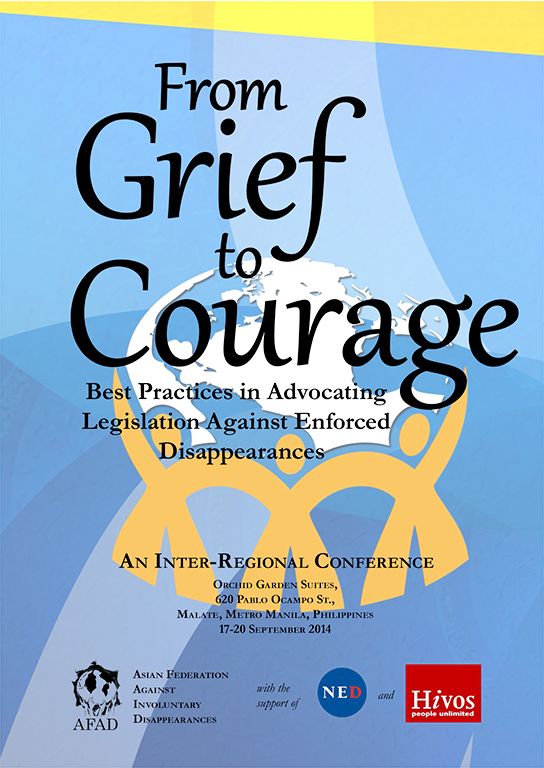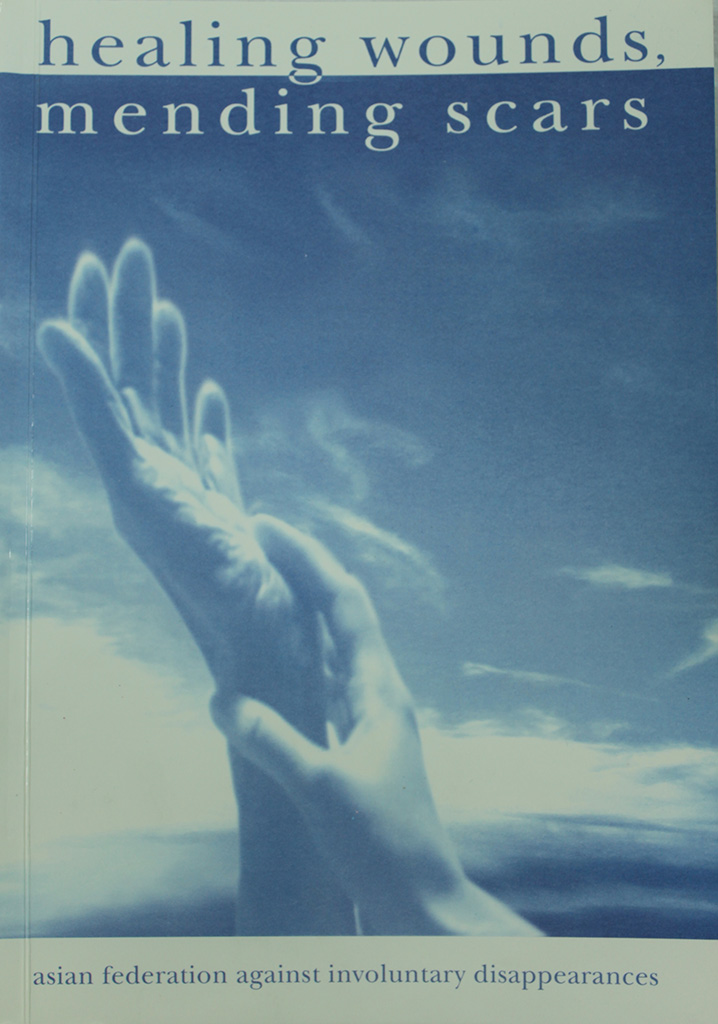- Category: Books
Best Practices in Advocating Legislation Against Enforced Disappearances
An Inter-Regional Conference
Orchid Garden Suites,
620 Pablo Oca mpo St.,
Malate, Metro Manila, Philippi nes
17-20 September 2014
- Category: Books

“From Grief to Courage,” this fifth book of the Asian Federation Against Involuntary Disappearances (AFAD) is launched on the occasion of AFAD’s 17th year as a Federation. A product of the conference on “Best Practices in Advocating Legislation Against Enforced Disappearances,” the book chronicles best practices in many of the countries represented in the conference, which went beyond advocating for legislation against enforced disappearances.
The book attempts to share the results of AFAD’s solidarity work at its best. It highlights the strength of the responses of the international community to the global phenomenon of enforced disappearances and the hard-earned fruits that have come to some realization in some regions and which we strive to replicate in our continent, where disappearances continue and where truth and justice remain elusive.
Every best practice is a concrete manifestation of the struggle of memory against forgetting. The evil of enforced disappearance is being equally responded to by the formidable strength of the families of the disappeared, whose role in the fight against this abominable crime is central. Hand in hand with the families is the indispensable support of civil society, as enforced disappearance is a social crime.
- Category: Books
“Beyond Tears and Borders,” the fourth book of the Asian Federation Against Involuntary Disappearances (AFAD), is launched on the occasion of the 2013 commemoration of the International Day of the Disappeared. The book serves as a fitting tribute to all the desaparecidos of the world and their suffering families. It attempts to present the updated phenomenon of enforced disappearances in countries where there is an AFAD presence.
An integral part of the Federation’s Research and Documentation work, the book attempts to convey the message that enforced disappearances occurred and continue to occur in the vast Asian continent in the context of a poor human rights record worsened by the absence of strong regional human rights mechanisms for protection and where empowerment of the victims is found, sadly, wanting.
- Category: Books
AFAD’s third book, Reclaiming Stolen Lives is a sincere attempt to delve deeply into the scourge of enforced disappearances in South and Southeast Asian countries and the uphill struggle of the Asian Federation Against Involuntary Disappearances (AFAD) to continue treading the long and winding road in its member-organizations’ collective journey towards a world without desaparecidos. Linking arms with the Latin American Federation of Associations of Relatives of Disappeared-Detainees (FEDEFAM) and its other sisters and brothers in Africa and Europe who are equally victimized by this malady, AFAD forges on amidst internal and external threats. In the course of its journey, AFAD lost its former Chairperson, Munir who was treacherously murdered by arsenic poisoning on a Garuda flight from Jakarta to Amsterdam via Singapore on 7 September 2004. The Federation also lost its woman human rights defender in Kashmir, Aasia Jeelani who was killed by a landmine in an election monitoring exercise in the north of Kashmir on 20 April 2004.
- Category: Books
 “Healing Wounds, Mending Scars,” is a response to the challenge of disclosing the phenomenon of enforced or involuntary disappearances in a significant number of countries in the Asian continent, which, as per report of the United Nations Working Group of Enforced or Involuntary Disappearances (UNWGEID), has the highest number of cases reported during the last two of years.
“Healing Wounds, Mending Scars,” is a response to the challenge of disclosing the phenomenon of enforced or involuntary disappearances in a significant number of countries in the Asian continent, which, as per report of the United Nations Working Group of Enforced or Involuntary Disappearances (UNWGEID), has the highest number of cases reported during the last two of years.
Enforced or involuntary disappearance is the cruelest form of human rights violation. Its concrete manifestations on the families of the victims could be gleaned from the vivid true-to-life stories of pain, anguish, and continuing torture suffered by the survivors – fathers, mothers, brothers, sisters, sons and daughters of the disappeared, many of whom remain unhealed due to the loss of their loved ones.
During this period when the member-states of the United Nations Commission on Human Rights are seriously drafting, in a manner so legalistic, a legally-binding normative instrument for the protection of all persons from enforced or involuntary disappearances, the publication of this book is timely.
